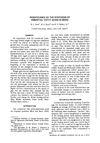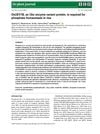 1 citations,
March 2022 in “IntechOpen eBooks”
1 citations,
March 2022 in “IntechOpen eBooks” Collagen is crucial for health and treating certain diseases, and supplements can improve skin, nails, and hair conditions.
 January 2020 in “Journal of dermatology research and therapy”
January 2020 in “Journal of dermatology research and therapy” Most over-the-counter hair loss treatments lack strong evidence of effectiveness but cost nearly as much as the proven treatment, minoxidil.
 November 2024 in “Skin Appendage Disorders”
November 2024 in “Skin Appendage Disorders” Misinformation about alopecia can lead to poor treatment, so it's important for healthcare professionals to correct myths.
 October 2024 in “Journal of Cosmetic Dermatology”
October 2024 in “Journal of Cosmetic Dermatology” Over half of young people in Saudi Arabia experience early gray hair, linked to factors like smoking, stress, and family history.
 October 2024 in “Frontiers in Nutrition”
October 2024 in “Frontiers in Nutrition” Vitamin D deficiency is common in people with certain types of hair loss, like alopecia areata and female pattern hair loss.
 1 citations,
October 2015 in “CRC Press eBooks”
1 citations,
October 2015 in “CRC Press eBooks” Nutricosmetics with active ingredients can help with hair loss and improve hair growth.
 240 citations,
February 2005 in “Diabetes Care”
240 citations,
February 2005 in “Diabetes Care” Patients need long-term care after bariatric surgery to manage potential nutritional and metabolic issues.
 45 citations,
June 2016 in “Anais brasileiros de dermatologia/Anais Brasileiros de Dermatologia”
45 citations,
June 2016 in “Anais brasileiros de dermatologia/Anais Brasileiros de Dermatologia” Silicon can improve skin and hair health, but more research is needed.
 20 citations,
June 2016 in “Magnesium research”
20 citations,
June 2016 in “Magnesium research” Hair follicles help magnesium get through the skin more effectively.
 15 citations,
August 2016 in “Current Urology Reports”
15 citations,
August 2016 in “Current Urology Reports” Nandrolone and oxandrolone could help treat male health issues like muscle loss and low testosterone.
 7 citations,
April 2012 in “Clinical investigation”
7 citations,
April 2012 in “Clinical investigation” Transdermal testosterone can improve sexual desire in postmenopausal women but lacks long-term safety data and is not FDA-approved for this use.
 3 citations,
September 1975 in “Journal of animal science/Journal of animal science ... and ASAS reference compendium”
3 citations,
September 1975 in “Journal of animal science/Journal of animal science ... and ASAS reference compendium” Pigs can make some essential fats and don't need them all in their diet to grow and stay healthy.
 1 citations,
January 2015 in “Hair therapy & transplantation”
1 citations,
January 2015 in “Hair therapy & transplantation” Some supplements and hormones can increase hair loss by raising DHT levels.
 506 citations,
March 2005 in “The Journal of Clinical Endocrinology and Metabolism”
506 citations,
March 2005 in “The Journal of Clinical Endocrinology and Metabolism” Testosterone therapy improves physical function, strength, and body composition in older men with low testosterone levels.
 251 citations,
October 2014 in “The Journal of Clinical Endocrinology & Metabolism”
251 citations,
October 2014 in “The Journal of Clinical Endocrinology & Metabolism” The guidelines advise against using testosterone and DHEA in women for most conditions due to safety and effectiveness concerns, but suggest considering testosterone for postmenopausal women with low sexual desire.
 75 citations,
May 2013 in “Journal of the American Academy of Dermatology”
75 citations,
May 2013 in “Journal of the American Academy of Dermatology” Zinc deficiency in children can cause skin issues and can be serious if not diagnosed and treated properly.
 63 citations,
March 2000 in “Annals of clinical psychiatry”
63 citations,
March 2000 in “Annals of clinical psychiatry” Some psychiatric medications can cause hair loss, but it usually grows back after adjusting the medication.
 62 citations,
January 2013 in “Skin Pharmacology and Physiology”
62 citations,
January 2013 in “Skin Pharmacology and Physiology” Low iron and vitamin D levels are linked to hair loss in women.
 46 citations,
January 2008 in “Climacteric”
46 citations,
January 2008 in “Climacteric” Testosterone therapy can help improve sexual desire and function in postmenopausal women but may cause side effects and is not FDA-approved for this use.
 45 citations,
February 2001 in “Joint bone spine”
45 citations,
February 2001 in “Joint bone spine” Gonadal dysgenesis, like Turner's and Klinefelter's syndromes, negatively affects bone health, but hormone treatments can help.
 37 citations,
January 2019 in “Dermatologic Therapy”
37 citations,
January 2019 in “Dermatologic Therapy” A dietary supplement with Boswellia serrata, Curcuma longa, and Vitis vinifera showed potential improvement in hair health for telogen effluvium patients, but more research is needed.
 36 citations,
October 2016 in “Bone”
36 citations,
October 2016 in “Bone” A male with aromatase deficiency improved bone health with estradiol treatment.
 28 citations,
November 2013 in “The FASEB journal”
28 citations,
November 2013 in “The FASEB journal” Mice with CBS deficiency are healthier on a low-methionine diet.
 19 citations,
January 2011 in “Obstetrics and gynecology international”
19 citations,
January 2011 in “Obstetrics and gynecology international” Red clover extract improved hair, skin, mood, sleep, and tiredness in postmenopausal women.
 19 citations,
September 1995 in “Food and nutrition bulletin”
19 citations,
September 1995 in “Food and nutrition bulletin” Leucaena leucocephala is nutritious but needs careful processing to remove toxins.
 18 citations,
April 2013 in “Inflammatory Bowel Diseases”
18 citations,
April 2013 in “Inflammatory Bowel Diseases” People with Inflammatory Bowel Disease often lose hair due to stress, medication side effects, or lack of nutrients, and treatment depends on the specific cause.
 10 citations,
August 2021 in “Journal of Cosmetic Dermatology”
10 citations,
August 2021 in “Journal of Cosmetic Dermatology” Most patients with telogen effluvium had low iron and vitamin D levels; iron supplements were commonly prescribed.
 10 citations,
May 1986 in “Experientia”
10 citations,
May 1986 in “Experientia” Too much zinc in the diet can cause hair loss and color change in young mice by reducing copper in the body.
 7 citations,
January 2017 in “Journal of cosmetology & trichology”
7 citations,
January 2017 in “Journal of cosmetology & trichology” Good nutrition is crucial for healthy hair and can help with hair loss without medication.
 4 citations,
February 2021 in “Plant journal”
4 citations,
February 2021 in “Plant journal” OsUEV1B protein is essential for controlling phosphate levels in rice.






























